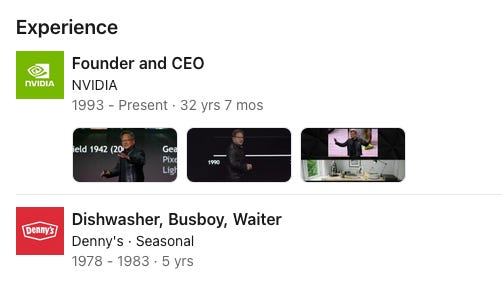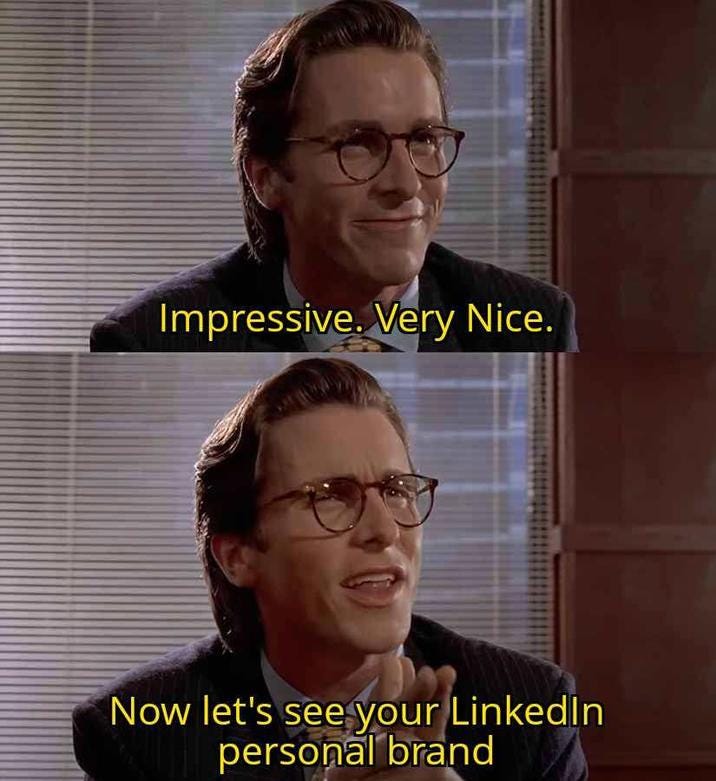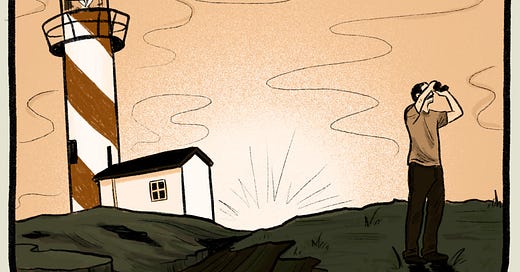In Praise of the Part-Time Job
This July, I'm sharing why this is my favorite tip for incoming college students, some insights on personal branding, and my new favorite newsletter about "the illustrated history of work"!
Happy July, everyone! For this month’s Career Camp Substack, I am sharing my favorite tip for incoming college students (something that Jensen Huang would approve of), some insights on personal branding (what even is it anyway?), and my new favorite newsletter about “the illustrated history of work”!
Enjoy July,
Connie
In Praise of the Part-Time Job
You may have heard of Jensen Huang, Founder and CEO of NVIDIA, and local hometown hero for the good people of Taiwan. He’s best known for founding one of the biggest GPU and computer hardware companies in the world, and also for being a swashbuckling entrepreneur in a black leather jacket. (Apparently turtlenecks were already taken as a uniform.)
But did you know what he used to do before NVIDIA?

That’s right, folks - Jensen Huang used to work at Denny’s. If you’ve never had the chance to visit Denny’s (and enjoy my favorite, which is Moons Over My Hammy), it is an American all-day diner chain, serving coffee and brunch favorites. It is not a glamorous place to work, but it is right up there on Jensen’s LinkedIn profile.
I bring up Jensen Huang’s resume because of a recent conversation I had with a graduated high school senior. When he asked me what was the best way to set himself up for a summer internship after his first year of college, I was frank - internships are hard to get and mostly reserved for juniors and seniors who are looking ahead to graduation. And almost everything you’ve done in high school ages very quickly in college - whether it’s a club leadership position, local award, or a volunteer gig.
So how do you get something on your resume quickly? The answer is simple - get yourself a part-time job of almost any sort. Here’s why and how:
Why a part-time job?
💸 It teaches you the value of a dollar: working part-time while you’re in college is not just an important way to earn money and support yourself. It is oftentimes for American college students the first time you’re actually earning your own money and hence appreciating how much it takes. A rising college senior told me, she had to dig frozen sherbert and fruit out of a freezer for an hour before she could afford one of the same smoothies she was making, which really made her think twice about eating out. There’s truly nothing like actual work to give you perspective on money, and if you’ve never had a paying job before, this is the most important thing you can do for yourself in college.
💎 It shows employers something basic and valuable about you: when you hold down a part-time job, it tells people that you are able to do the basics of showing up on time and consistently, doing what you’re told, and working with other people. You might be shocked to find out that those things are not a given for every job-seeking candidate. Those do seem like low bars to clear, but I’ve met plenty of people who can’t do these things, and as you go through life, you will too.
🧹🪣 It shows employers that no job is too small or big for you: this is something approaching a hot take on my part, but I think that the messier, dirtier, and more unglamorous the job, the better it can look on a resume. If someone has been a busboy at a fast food restaurant like Jensen, I know there’s a good chance they’ve seen a lot of messes, and they’re not afraid to clean it up, even if it’s not their fault. They know the hard work required to keep a F&B operation moving smoothly, which is absolutely no small task. If I see that someone had the opening shift at the university gym, I will absolutely be impressed that they were able to get there before 6 AM three times a week and get everything set up to accommodate the earliest workouts. Hard work speaks volumes.
Last month, I spoke to a headhunter about working with early-career professionals, and he told me that the most common and ridiculous thing he saw about new college graduates is that they always want to be working on strategy or something high-level. But most employers and companies aren’t willing to entrust those operations to someone who hasn’t gotten their hands dirty before. It’s not just that experience in execution helps you get better at what you do and give you certain insights; it’s also that there are plenty of people who want to do the high-level thinking and get the credit for the impact on the company, but not enough people who are willing to put in the hard work. Hard work gets you places - not by itself, but rarely without it are people able to succeed.
As someone who held no less than ten part-time jobs and internships during college (not all at once), I can tell you that those experiences taught me just as much, if not more, than being in class at a top 10 US university.

So let’s say I’ve convinced you that getting a part-time job when you get to college is going to be a great idea.
How do you go about this, anyway?
💡 Pick a job that you’re interested in or related to what you want to do: during college, I worked two different bookstore jobs and tutoring jobs. As a lifelong book lover, I found it easy to pitch myself for those jobs, and I fit in well with my fellow co-workers. When I worked as a tutor, it was incredibly educational for me to work in a Chicago Public School, because it exposed me to a very different side of public education and ended up being very formative for my career in education. You can get a lot out of these part-time jobs!
🏫 Pick something at the school: universities are set up to run on a certain amount of student labor, whether you’re checking out books at the library, being a receptionist at the school gym, a research assistant for a professor’s long-running study, or fundraising by calling alumni. There is often a huge amount of student jobs that are typically reasonably well-paid (well above minimum wage) and undemanding. Many people can do their homework at the same time, pick up shifts before or after class at a convenient time, and usually don’t have to do anything more physical than lift a few boxes. This should be your first go-to for an easy part-time job of 5-10 hours a week.
☕ Pick something around the school: a school will usually also have a large ecosystem of stores and restaurants in the surrounding area. Cafes, restaurants, bookstores, markets, and bars typically hire many college and graduate students. There’s always turnover, as students graduate and leave, so while there’s definitely competition for these jobs, the likelihood that you can find one is typically far higher than for a selective internship.
🙋🏻♀️ Talk to your university career services center: these people are the gatekeepers when it comes to any job around school. Make sure that during your first month on campus, you visit and make sure they approve your resume so you can go on Handshake or another job searching platform that they use at the school. And if there’s anything you’re really interested in, make sure they know so that if anything comes up, they can help you.
Honestly, I don’t see enough people these days talking about the value and importance of a part-time job in college. Finding work seems to be mostly about prestige and getting that brand company name on your resume, typically through an internship. But part-time jobs are a much easier way of establishing a proven track record for yourself, when it comes to work, and trust me, they have plenty to teach you.
If you’re an incoming college student considering a part-time job, please talk to me to get the process started! And if you’ve had a story about a college job that you want to share, please get in touch too (connie@career-camp.org).

Personal Branding, Before It was A Thing
On July 5, I was invited as one of one of three panel speakers by Beyond Taiwan to participate in their inaugural BT Alumni workshop, entitled Crafting Your Personal Brand In and Beyond College. Last year, I served as a BT Mentor for a high school student in Taiwan applying to college in the US, and this month, it was wonderful to share some thoughts with this audience of college students and early-career professionals, so I wanted to capture a few things we discussed here:
🪞 The first step to doing personal branding well is being self-aware. As a Millennial, I attended college and got started in the working world at a time before everyone was talking about personal branding, so I’ve always had a different conception of what it meant. But I had a self-awareness that there were certain things I was good at and enjoyed, like making friends with people, being extroverted, and building connections. Slowly, this self-awareness was what evolved into a story that I started telling other people about myself and that I also started consciously applying wherever I went.
🗣 Being a consistent person is truly important. I’ve always believed it was important to show people the same, positive side of myself whether we were in class, in a club or extracurricular activity together, or at work. I have trouble trusting people that I see act one way in a situation, and then act a different way with another audience. So for me at work, that means doing my best to be authentic but not fake, not indulge in gossip too much, and not to kiss up to anyone in particular.
🌐 I pay attention to building my brand on my website and LinkedIn. As a coach and entrepreneur I have my website which I’ve been working on for over five years now, periodically adding new things. Just like a personal brand, this is always in progress and up for revisions. My LinkedIn is something I’ve really put effort into over the last fifteen years, connecting with people that I’ve met through work and networking, and also asking for references and recommendations from nearly every single job I’ve had, beginning with my college internship. You can ask for recommendations from anyone that you’ve worked with, if they’ve reported to you or worked closely with you, not just your supervisor. And when you keep doing this over time, this shows your consistency too!
🛑 I do my best to keep my personal life private. Especially these days as an entrepreneur, I feel the need to document my thoughts and turn a lot of the interactions I have into content. But the truth is that not all of your life is grist for the mill. Sometimes life with two young children is lovely and sometimes it’s frustrating, but it often doesn’t have anything to do with my work as a career coach. My personal social media is private, and these days, I find more comfort in drawing lines and not putting myself out there entirely.
What questions do you have about personal branding? And if you’re a seasoned professional, what insights do you want to share? I do get asked this question sometimes by my students and clients, so send me an email (connie@career-camp.org), and please let me know what you think! Thanks again to Coco, Zoe, and Jonathan, and the BT Team for organizing this event!

Finally, Some Extra Reading- I Mean, Viewing: A Career, Drawn
Last year, I started reading the Shifts newsletter, which is published by the Washington Post. Entitled “an illustrated history of work,” Shifts are stories drawn in comic form about people with unconventional and interesting jobs, like internet content moderators, lighthouse keepers, online dating consultants, bionic physical therapists, and film projectionists. I loved reading them, because the way that these people fell into these lines of work illustrate exactly how unpredictable life and careers can be.
When I spend time learning and contemplating a job I’ve never heard of or imagined for myself before, I realize certain things about who I think I am (I’m not a very mentally resilient person - I probably wouldn’t last a whole week at a content moderation job because I’d see too much upsetting stuff!) and usually encounter some unexpected things (being a film projectionist is so physical and active that it seems like the opposite of watching a film). In a sense, being exposed to these experiences helps me push at the edges of who I am and better understand myself and my potential. Sometimes, we’re more flexible than we think we are, and sometimes, we are really not naturally cut out for a certain line of work either.
Hats off to Beatrix Lockwood, the editor, and Maya Scarpa, the illustrator, for such a lovely series! For the full list of Shifts stories so far, click on the link for Beatrix. Subscribe here to receive Shifts in your inbox.
That’s all (thankfully - sorry I wrote a lot), and I’ll see you next month!
Connie
P.S. Thanks for reading to the end! If you or someone you know could benefit from a complimentary 60-minute coaching session with me, click on the link here and make a booking today!



